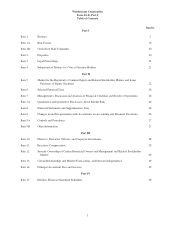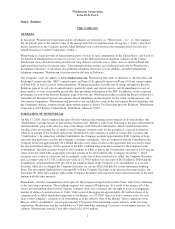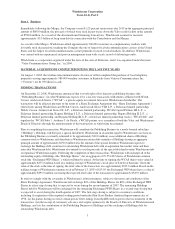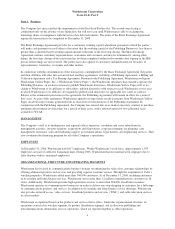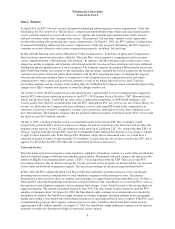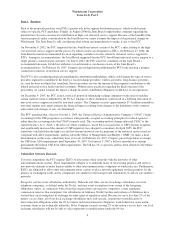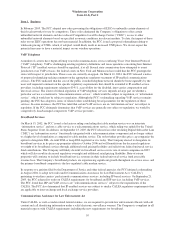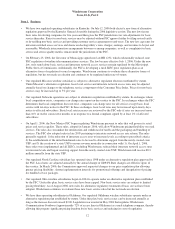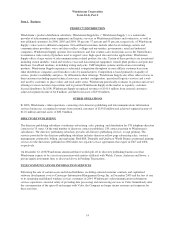Windstream 2006 Annual Report Download - page 75
Download and view the complete annual report
Please find page 75 of the 2006 Windstream annual report below. You can navigate through the pages in the report by either clicking on the pages listed below, or by using the keyword search tool below to find specific information within the annual report.
Windstream Corporation
Form 10-K, Part I
Item 1. Business
Customer Proprietary Network Information
Customer Proprietary Network Information (“CPNI”) includes information such as the phone numbers dialed,
frequency of calls, duration of calls and services purchased by a customer. The 96 Act requires service providers to
ensure the confidentiality of CPNI and provides that CPNI may be used, disclosed or shared only if required by law,
the customer has given approval, or CPNI is necessary for the provision of services from which CPNI was derived. The
FCC has implemented rules that require service providers to establish safeguards to prevent the unauthorized
disclosure of CPNI. The Company has implemented all required safeguards in accordance with FCC rules.
On February 10, 2006, the FCC issued a notice of proposed rulemaking seeking comment as to the adequacy of the
existing safeguards. Specifically, the FCC sought comment on the need for additional security measures including:
consumer-set passwords, data encryption, audit trails, data retention limits, and consumer notice of security breaches.
The Company cannot estimate at this time the financial or operational impacts resulting from the proposed CPNI
changes, if any.
STATE REGULATION
Local and Intrastate Rate Regulation
Most states in which our ILEC subsidiaries operate provide alternatives to rate-of-return regulation for local and
intrastate services, either by law or PSC rules. We have elected alternative regulation for certain of our ILEC
subsidiaries in Alabama, Arkansas, Florida, Georgia, Kentucky, Missouri, Nebraska, North Carolina, New Mexico,
Ohio, Oklahoma, Pennsylvania, South Carolina, and Texas. We continue to evaluate alternative regulation options in
markets where our ILEC subsidiaries remain subject to rate-of-return regulation, specifically Mississippi and New
York.
The following summary sets forth a description of the alternative regulation plan for each of the states in which
alternative regulation options exist:
• Our regulated Alabama wireline subsidiary has operated since 2005 under the price flexibility plan established by
the PSC. Under this plan basic residential local service rates are capped for two years. In 2005, the legislature
passed the Alabama Communications Reform Act of 2005. Under this Reform Act, only stand-alone basic service,
network access services and certain calling features remain regulated after February 1, 2007. We have elected to
be regulated under the Reform Act, effective February 1, 2007.
• Windstream Arkansas has operated since 1997 under an alternative regulation plan established by statute. Under
this plan, basic local rates and access rates may be adjusted annually by up to 75% of the annual change in the
Gross Domestic Product-Price Index (“GDP-PI”). Other local rates may be changed without PSC approval and
become effective upon the filing of revised tariffs. Windstream Communications Southwest has a reciprocity
agreement with the Arkansas PSC that provides that rates approved by the Texas PSC for Texarkana, TX are
deemed approved in Texarkana, AR. This reciprocity agreement ensures that all customers in Texarkana are
charged the same rates.
• Our regulated Florida wireline subsidiary operates under alternative regulation established by Florida statute.
Under this plan, basic local rates may be increased once in any twelve-month period by an amount not to exceed
the twelve-month change in the GDP-PI less 1%. Non-basic services are grouped by type into categories in
accordance with PSC rules. We may increase rates for non-basic services as long as the annual increase for any
such category does not exceed 6% in any twelve-month period. Non-basic rates can be increased by up to 20%
annually in exchanges where another local provider is providing service.
• Our regulated Georgia wireline subsidiaries operate under an alternative regulation plan established by statute.
Under this plan, basic local rates may be increased annually based on the annual change in GDP-PI. Other local
rates may be increased by filing revised tariffs.
11


